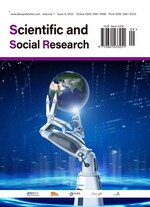Analysis of Spatiotemporal Evolution and Impediments in the Coupling Coordination between High-Quality Tourism Development and Urban Resilience in Chongqing
Abstract
In the context of a complex and volatile global environment and the post-pandemic era, tourism, as a vital engine for urban economic development, its high-quality development and the concurrent building of urban resilience against risk shocks have become pivotal for sustainable urban development. This study aims to systematically investigate the coupling and coordination relationship between high-quality tourism development and urban resilience in Chongqing, and to identify key factors constraining their synergistic advancement. Quantitative analysis was conducted using the entropy method, a coupling coordination index model, and an obstacle degree model. Key findings reveal that between 2019 and 2023, the coupling coordination degree between high-quality tourism development and urban resilience in Chongqing’s “One Zone and Two Clusters” exhibited a fluctuating upward trend. However, significant regional disparities exist, and each area faces distinct primary obstacles. Based on these findings, this study proposes targeted policy recommendations, including optimizing top-level design, strengthening resilience building, promoting tourism transformation and upgrading, and implementing differentiated development strategies. These recommendations aim to provide a scientific basis and decision-making references for the sustainable development of Chongqing’s tourism industry and the enhancement of urban resilience.
References
Klein RJT, Nicholls RJ, Thomalla F, 2003, Resilience to Natural Hazards: How Useful is this Concept? Environmental Hazards, 5(1–2): 35–45.
Cutter SL, Ash KD, Emrich CT, 2014, The Geographies of Community Disaster Resilience. Global Environmental Change, 29 + 65–77.
Cutter SL, Barnes L, Berry M, et al., 2008, A Place-based Model for Understanding Community Resilience to Natural Disasters. Global Environmental Change, 18(4): 598–606.
Kontokosta C, Malik A, 2018, The Resilience to Emergencies and Disasters Index: Applying Big Data to Benchmark and Validate Neighborhood Resilience Capacity. Sustainable Cities and Society, 2018(36): 272–285.
Shao YW, Xu J, 2015, Urban Resilience: A Conceptual Analysis Based on an International Literature Review. International Urban Planning, 30(2): 48–54.
Zhang SJ, Li Q, Yu SW, 2024, Evaluation and Promoting Strategies for Urban Resilience Construction in Wuhan. Safety and Environmental Engineering, 31(3): 65–75.
Hu Y, Zao YXZ, Lei JY, et al., 2024, Research on the Construction of Urban Resilience Evaluation System and Spatiotemporal Evolution in Four Major Urban Areas of Chongqing. Urban Construction Theory Research (Electronic Version), 2024(31): 211–215.
Zhu JH, Sun HX, 2020, Research on Spatiotemporal Evolution and Influencing Factors of Urban Resilience in China’s Three Major Urban Agglomerations. Soft Science, 34(2): 72–79.
Arta M, 2012, Tourism Development, Touristic Local Taxes and Local Human Resources: A Stable Way to Improve Efficiency and Effectiveness of Local Strategies of Development. Academicus International Scientific Journal, 6(3): 41–46.
Perez-Calderon A, 2010, Efficiency Measurement in Tourism: A Nonparametric Approach. Tourism Management, 31(1): 137–144.
Halenur M, 2011, Measuring the Efficiency of Tourism in Developing Countries. Tourism Economics, 17(2): 347–357.
Yuksel I, 2014, A Comparative Analysis of Tourism Efficiency Across Countries: A DEA Approach. Tourism Management, 2014(40): 103–112.
Branislav M, 2015, Efficiency of Tourism Development in the EU and Western Balkan Countries. Tourism Management, 20015(47): 179–192.
Peng SZ, Liu GJ, Liang W, 2024, Research on the Construction of an Evaluation Index System for High-Quality Tourism Development. China Business Review, 2024(4): 149–152.
He JM, 2018, Research on the System and Strategy of High-Quality Development of China’s Tourism Industry in the New Era. Tourism Tribune, 33(10): 9–11.
He YB, Zhou MH, Jia YL, et al., 2022, Research on High-Quality Development of Traditional Village Tourism Based on Resilience Measurement—A Case Study of Henan Province. Economic Geography, 42(8): 222–231.
Yan YB, Ouyang M, 2021, Construction and Application of an Evaluation Index System for High-Quality Red Tourism Development Based on the New Development Concept—A Case Study of Shaoshan City. Tourism Forum, 14(6): 29–40.
Zuo X, Tang YX, Yuan Y, et al., 2021, Evaluation of High-Quality Development of Zhangjiajie Tourism Economy and Research on Impediments. Statistics & Management, 36(6): 110–115.
Fan NN, 2024, Research on the Coupling and Driving Factors of High-Quality Tourism Development and Urban Resilience in the Mid-Yangtze River Urban Agglomeration, thesis, Sichuan Normal University.
Hu Q, 2023, Research on the Spatiotemporal Evolution Characteristics and Influencing Factors of Urban Resilience in the Wanjiang City Belt, thesis, Anhui Agricultural University.
Yang BH, 2021, Research on Urban Community Resilience Measurement and Its Influencing Factors under Public Health Emergencies, thesis, Northwest University.
Wei ZJ, Lu GH, Ou N, 2025, Research on the High-Quality Economic Development Index System and Measurement in Guizhou Province. Journal of Chuxiong Normal University, 40(3): 109–122.
Wang JW, Zhang H, Xu ST, et al., 2025, The Generative Logic and Influencing Mechanisms of High-Quality Tourism Development in Ice and Snow Cities. Geographical Science, published online, 1–15.
Zhang N, 2024, Research on the Coupled and Coordinated Development of Tourism Composite Systems in Western China, thesis, North Minzu University.

